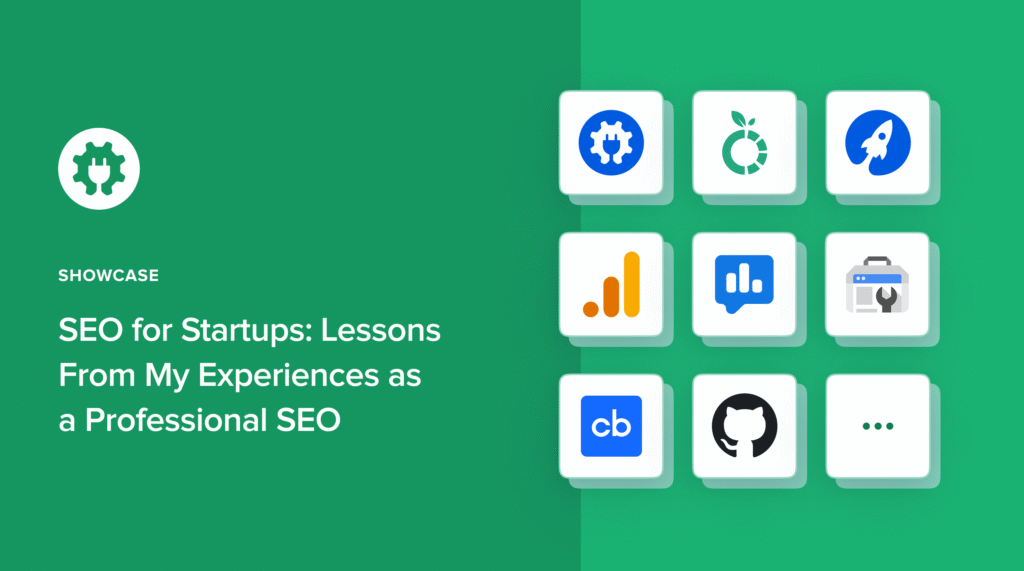Looking for tips on doing SEO for startups?
If you’re part of a startup, you already know how tough it is to get noticed online. That’s where search engine optimization (SEO) comes in. SEO helps your website show up when people search for what you offer, which is super important when you’re just starting and don’t have a huge marketing budget.
When I first started working as an SEO specialist for startups, I faced numerous challenges. I learned the hard way which tactics moved the needle and which ones wasted time. Over the years, I’ve gathered tips that helped me turn SEO from a confusing maze into a clear path toward growth.
In this post, I want to share practical, easy-to-follow SEO tips from my personal experience as a digital marketer for 7+ years. These aren’t just textbook ideas. They’re lessons that worked for me and can work for you, too. Whether you’re just launching or trying to boost your startup’s online presence, this guide will help you focus on what matters most in SEO.
In This Article
- Why Your Startup Should Invest in SEO
- Before You Get Started, Invest in the Right SEO Tools
- How to Do SEO for Startups (And Actually Get Results)
- 1. Define Your SEO Goals
- 2. Understand Your Audience Before Anything Else
- 3. Build a Solid, SEO-Friendly Website Structure
- 4. Focus on Keyword Research That Drives Results
- 5. Match Keyword Research With Search Intent
- 6. Create Valuable, Audience-Centric Content
- 7. Add Schema Markup to Boost Startup Visibility
- 8. Optimize for AI Overviews
- 9. Build Topical Authority
- 10. Earn High-Quality Backlinks Early
- 11. Boost Brand Visibility for Your Startup
- 1. Define Your SEO Goals
- SEO for Startups: Start Early, Win Fast
- SEO for Startups: Your FAQs Answered
Why Your Startup Should Invest in SEO
When you’re running a startup, it’s tempting to pour all your marketing budget into quick wins like paid ads. But here’s the thing: Ads stop working the second you stop paying. SEO, on the other hand, can keep bringing in traffic and leads long after you’ve done the work.
SEO isn’t just about ranking higher on Google. It’s about building a sustainable growth engine. For startups, that’s huge because it:
- Levels the playing field: You can compete with bigger brands if you target the right keywords and create valuable content.
- Brings in warm leads: People who find you via search are already interested in what you offer.
- Reduces customer acquisition costs: Organic traffic costs less over time compared to relying solely on paid ads.
- Builds credibility and trust: Showing up in search results signals to customers that you’re a legitimate, established brand.
From my experience, startups that start investing in SEO early have a significant advantage down the road. Even small, consistent efforts can compound into steady, long-term growth.
Think of SEO as planting seeds. It might take time for them to grow, but once they do, you’ll have a steady harvest of visitors, leads, and sales without constantly paying for every click.
Before You Get Started, Invest in the Right SEO Tools
The first thing I learned doing SEO for startups is that having the right tools can make or break your SEO efforts. Fortunately, I discovered All in One SEO (AIOSEO) early, and it changed everything.
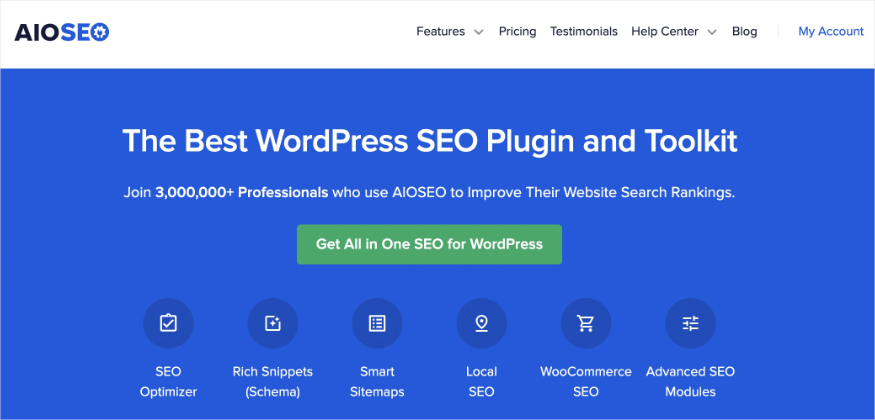
AIOSEO is a powerful yet easy-to-use WordPress plugin designed to help startups and small businesses get their SEO right without needing to be experts. Because of this, the plugin is trusted by over 3 million active users. You can rest assured it stays up to date on changes in SEO best practices and WordPress versions.
What I love about AIOSEO is that it has many features that can help you rank your startup’s website higher on Google and other search engines. Examples of said features include:
- AI Writing Assistant: Use the power of artificial intelligence (AI) to optimize your content for better search rankings.
- Author SEO: Boost your Google E-E-A-T signals right in WordPress, giving you an edge over competitors.
- AI Content Generator: Automatically repurpose blog posts into FAQs, email copy, key points, social media posts, and more from your blog posts.
- Advanced Robots.txt Generator: Easily generate and customize your robots.txt file for better crawling and indexing.
- TruSEO Score Analysis: Makes it easy to spot on-page SEO issues and gives recommendations for fixing them.
- Next-gen Schema Generator: This no-code schema generator enables you to generate and output any schema markup on your site.
- Link Assistant: Powerful internal linking tool that automates building links between pages on your site. It also gives you an audit of outbound links.
- SEO Preview: This gives you an overview of your search and social snippets and general SEO so you can improve your optimization.
- And more
Using AIOSEO helps me save hours each week and get better results faster. Instead of guessing what to optimize, I have a clear checklist and insights right in my dashboard.
If you’re starting out and want to simplify your SEO, I highly recommend giving AIOSEO a try. It’s a great tool for startups looking to get their SEO on track without the headache.
For step-by-step instructions on how to install AIOSEO, check our detailed installation guide.
How to Do SEO for Startups (And Actually Get Results)
SEO for startups can feel overwhelming at first. But breaking it down into clear, actionable steps makes it much more manageable.
The tips below come directly from my personal experience working with early-stage companies. This will help you skip the trial-and-error and focus on what works.
1. Define Your SEO Goals
Before you dive into keyword research or start creating content, it’s crucial to set clear, specific SEO goals. Without a defined purpose, your SEO efforts can become scattered, making it harder to see what’s working and what’s not.
Check out our guide on setting SEO goals for detailed instructions.
When I first began working with startups, the very first question we’d ask was: “What do we want SEO to achieve for the business?”
The answers varied depending on the startup’s stage, industry, and priorities. But having those goals upfront kept every SEO move focused and measurable.
Here are some common SEO goals that startups might set:
Increase Website Traffic
This is often the first goal for brand-new startups trying to build awareness. The focus is on attracting as many relevant visitors as possible.
Generate Leads or Sign-ups
If your startup offers a service or software, driving qualified leads or sign-ups is key. Your SEO strategy would focus on targeting keywords that potential customers use when ready to take action. For instance, a SaaS startup might want to increase free trial sign-ups by optimizing landing pages and blog posts around high-intent keywords.
Need help generating leads?
Here’s our list of recommended lead generation tools.
Boost Sales or Conversions
For startups selling products online, SEO goals can include increasing organic sales or conversions. This could mean optimizing product pages and targeting keywords like “best for [specific use].”
Build Brand Authority and Trust
Becoming a thought leader in your niche is a great way to own the narrative around your product. Your SEO goals might focus on ranking for educational content and authoritative blog posts that help build credibility. For example, a fintech startup might want to rank for “how to save money as a first-time homebuyer” or “budgeting tips for freelancers” to attract and educate their audience.
Improve Local Visibility
If your startup serves a local market, a goal could be to increase traffic and leads from your local market. This would involve local SEO tactics like optimizing Google My Business and local citations.
Having clear goals also helps you avoid common SEO pitfalls, like chasing vanity metrics. For example, ranking for a keyword that brings lots of traffic but no conversions isn’t helpful if your goal is to generate paying customers.
When you set specific, measurable, achievable, relevant, and time-bound (SMART) goals, your SEO plan becomes much easier to track and optimize. For example, “Generate 200 qualified leads from organic search in the next 6 months by targeting long-tail keywords related to small business accounting software.” It’s a clear goal that guides your keyword and content strategy.
Bottom line: Defining your SEO goals early sets the stage for success. It keeps your efforts aligned with your startup’s bigger picture and helps you spend your limited time and resources wisely.
2. Understand Your Audience Before Anything Else
Knowing who you’re trying to reach is the foundation of SEO. Early in my startup SEO journey, I learned the hard way that guessing your audience leads to missed opportunities.
Fortunately, getting to know your audience is simple. You can use surveys and customer interviews to get qualitative data about your audience. One tool that makes this easy is UserFeedback.

UserFeedback is the best WordPress plugin for getting insights into your visitors' preferences. I love that it helps me understand exactly what my site visitors want. This is because it makes it easy to run targeted surveys. It also has a heatmap feature that allows me to see firsthand how visitors experience my sites.
Here’s my list of the best website visitor tracking tools for more options.
Besides UserFeedback, you can also use tools like Google Analytics (GA4) to gain insights into your audience’s interests, problems, and search habits. This helped me tailor content that truly spoke to them, resulting in higher conversion rates.
Taking it a step further, I also created audience personas. These fictional profiles represent our ideal customers. Each persona had details like:
- Age
- Job role
- Pain points
- Favorite online hangouts
- Geographic data
- And more
This made it easier for the whole team to picture exactly who we were writing for. Instead of producing generic blog posts, we crafted targeted articles, landing pages, and resources that felt personal, relevant, and valuable.
As a result, engagement and conversions went up because our content resonated with the right people.
3. Build a Solid, SEO-Friendly Website Structure
A clean, easy-to-navigate website benefits both visitors and search engines. I learned this the hard way in my early days after creating a messy site with confusing URLs and random linking. It not only frustrated users but also made it harder for Google to crawl and index my pages.
When I fixed the structure, I focused on:
- Clear categories and subcategories: This helps group related content logically.
- Simple, descriptive URLs: Choose a simple and clear URL structure that users and search engines can understand. For example, use startupname.com/blog/seo-tips instead of startupname.com/post?id=12345.
- Strategic internal linking: Linking to relevant pages to help visitors discover more content and pass SEO value around the site.
- A clear hierarchy: Making sure the homepage links to category pages, which link to related articles or product pages.
This is one area where I truly appreciated the power of AIOSEO. Its Link Assistant feature helps me organize my internal links.
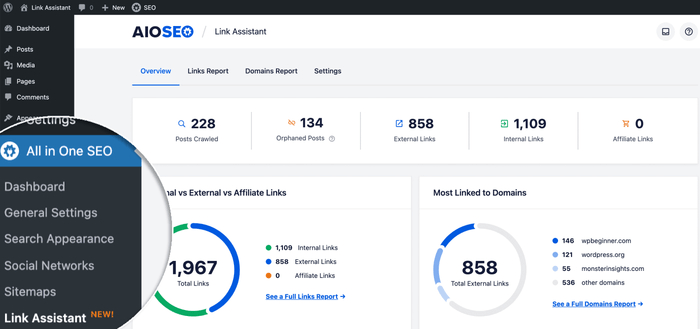
Link Assistant scans your site and generates a detailed report of all your links. It provides internal linking suggestions and identifies orphan pages, helping you improve site structure and SEO.
The best part is that you don’t even need to open a post to add the links. You can just click a button straight from the Link Assistant dashboard.
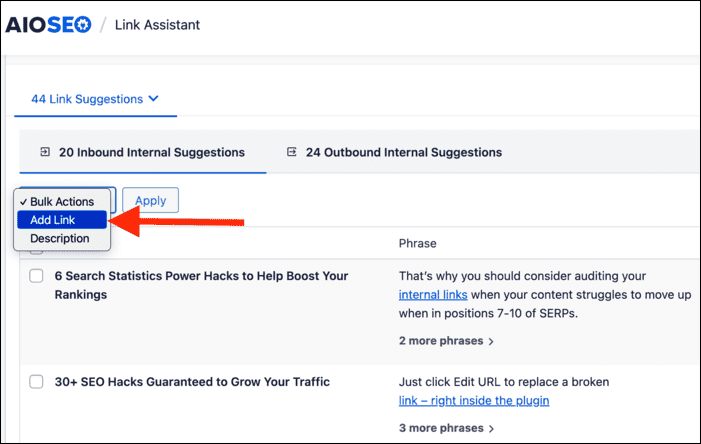
Another invaluable feature that helped with site structure is the breadcrumbs module.
Breadcrumbs are a type of secondary navigation that shows users the path they took (or could take) through your website’s hierarchy.
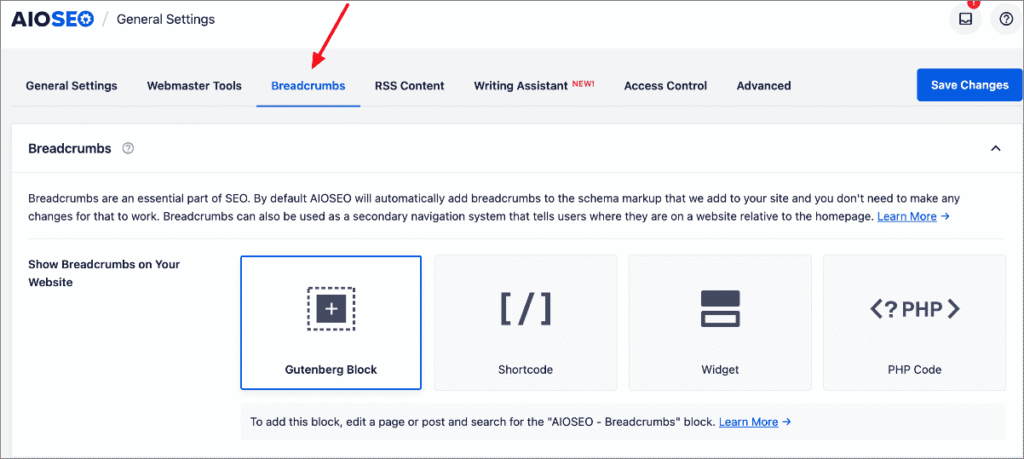
I love that AIOSEO also automatically adds breadcrumb schema, making it easier for search engines to understand your site’s structure.
For more on this, check out our tutorial on adding breadcrumb navigation in WordPress.
When I improved my site’s structure using these and other strategies, my search rankings improved. Time on page also increased because visitors found it easier to explore.
4. Focus on Keyword Research That Drives Results
Keyword research is more than finding popular search terms. It’s about understanding what people want when they search on Google.
For startups, I recommend that you start by targeting low-competition keywords. These are keywords most of your competitors aren’t going for but are relevant to your audience. I love these types of keywords because they:
- Bring in highly targeted visitors who are more likely to engage with your content or convert.
- Help you rank faster since you’re not competing with big, established brands.
- Build early SEO momentum that makes it easier to target more competitive keywords later.
- Give you valuable insights into your audience’s specific problems and interests.
How do you find these keywords?
I, too, struggled to find low-competition keywords until I discovered LowFruits.
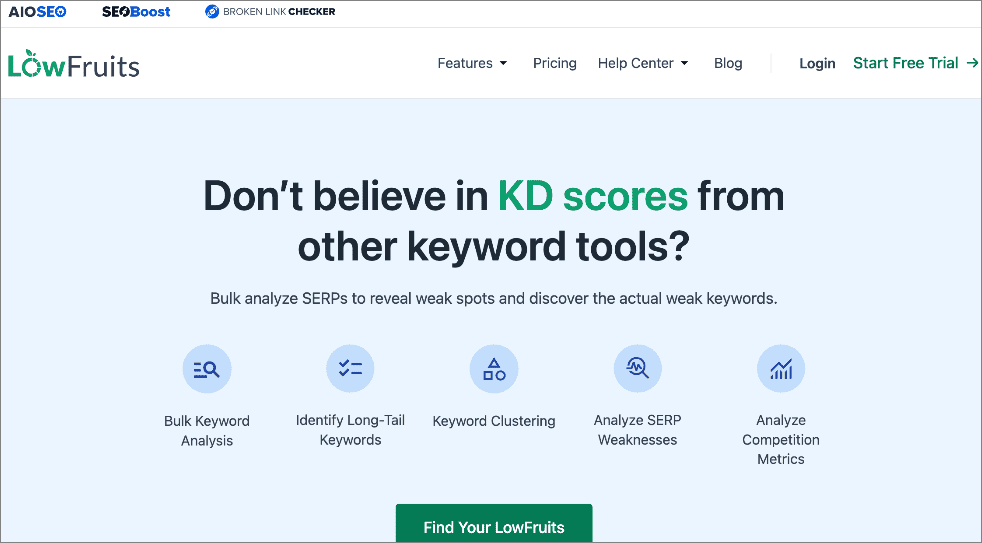
LowFruits is a keyword research tool designed to uncover low-competition keywords. It’s the perfect solution to find keywords that result in quick SEO wins.
What I like the most about LowFruits is that it helps identify Weak Spots on SERPs. This allows you to target keywords with a higher chance of ranking. It also gives you valuable insights into search volume, keyword difficulty, and related keywords. This helps you shape a stronger SEO strategy.
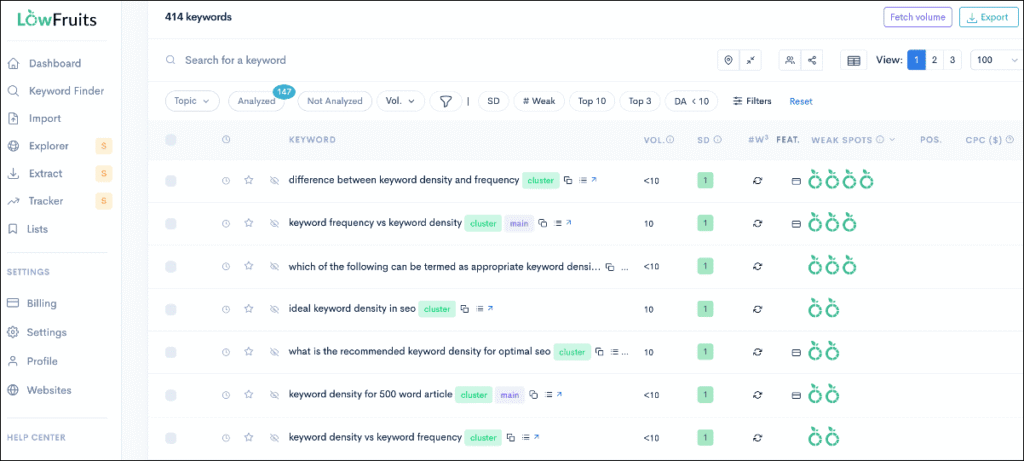
To find keywords that actually move the needle for your startup, start by thinking about the problems you solve and the words your ideal customers would type into Google. For example, if you’re a project management SaaS targeting small teams, a keyword like “project management tool for lean teams” is far more valuable than a generic term like “project management.”
The goal is to rank for search terms that drive sign-ups, demos, or purchases—not just inflate your traffic numbers.
5. Match Keyword Research With Search Intent
Turning your startup’s website into a revenue generator requires more than just keyword research. You need to match your keywords with search intent. Search intent (also known as user intent or keyword intent) is the goal or purpose of a query searched by the user.
Search intent is the bridge between what people type into Google and the action you want them to take. If you target the wrong intent, you might get traffic that never converts.
There are 4 main types of user intent:
- Informational: People are looking for answers, guides, or explanations.
Example: “How to create a project timeline.” - Navigational: People are searching for a specific brand, product, or website.
Example: “Trello login” or “Asana pricing page.” - Commercial: People are comparing options before making a purchase decision. Example: “Trello vs Asana” or “best project management tools for remote teams.”
- Transactional: People are ready to buy, sign up, or take action.
Example: “best project management software for startups.”
Besides higher conversion rates, search intent also has the advantage of helping you maximize your resources. Startups usually have limited time and budget, even for SEO. Targeting the right intent means you’re focusing on keywords that can bring a high return on investment (ROI), not just traffic.
Extra tip: I always ask myself, “If someone searches this keyword, what do they expect to see?” If the content I create delivers that, it’s far more likely to rank and convert.
6. Create Valuable, Audience-Centric Content
One of the fastest ways to grow your startup’s online presence is by creating content that genuinely resonates with your audience. The right content doesn’t just attract visitors. It builds trust, answers questions, and positions your brand as a go-to resource. To create such content, focus on:
- Answering specific audience questions: This means creating content that solves real problems.
- Using a variety of formats: Think blog posts, how-to guides, videos, infographics, FAQs, and more.
- Consistency: Publish regularly to stay on the audience’s radar.
- Depth over quantity: Better to have 1 in-depth, authoritative article than 5 thin posts.
My favorite tool to use during the content creation process is SEOBoost.

SEOBoost is a full-suite content management platform you can use to:
- Create content briefs and outlines.
- Build topic reports.
- Use AI to speed up content optimization.
With SEOBoost, creating high-quality audience-centric content becomes a breeze. It gives you data-driven reports that guide the entire content creation process.
Authenticity also makes a huge difference. Sharing personal experiences, lessons learned, and honest recommendations helps build trust and makes your content more shareable.
Pro tip: To create that “Wow, this is exactly what I needed” reaction, focus on solving a specific problem your audience is struggling with. Use clear examples, actionable steps, and relatable language. This is what sets you apart from 90% of your competition.
Pro tip: To create that “Wow, this is exactly what I needed” reaction, focus on solving a specific problem your audience is struggling with. Use clear examples, actionable steps, and relatable language. This is what sets you apart from 90% of your competition.
7. Add Schema Markup to Boost Startup Visibility
Structured data is a type of code you add to your website to help search engines better understand your content. It uses a standardized format called schema markup to define key details about your pages, like product, service, event, blog post, or something else entirely.
While your visitors won’t see this code, search engines will. This helps them display enhanced results in the SERPs, known as rich snippets. These show your product ratings, upcoming events, FAQs, or pricing right under your listing.
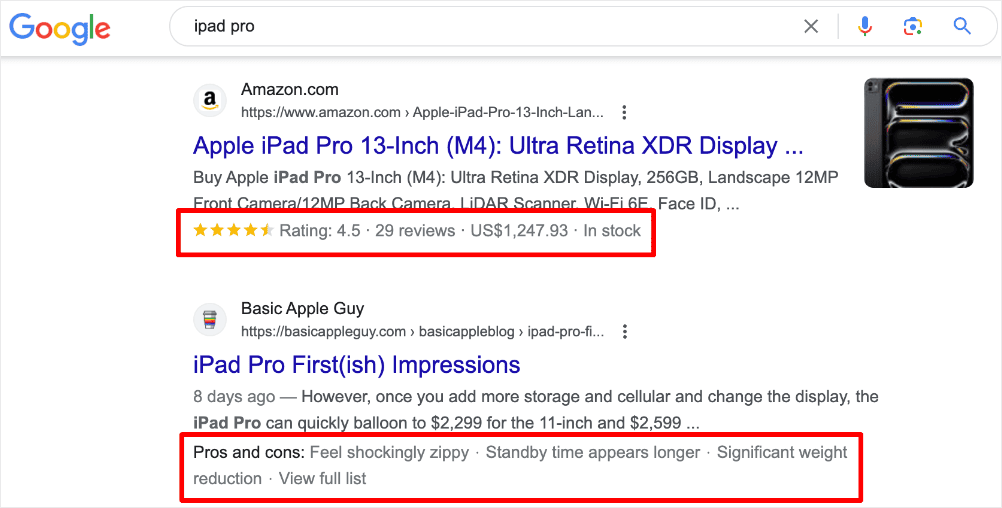
For startups, schema markup is a low-effort, high-impact SEO move. It gives search engines extra context about your business. This helps you stand out against bigger, more established competitors. And thanks to tools like AIOSEO’s next-gen Schema Generator, you don’t have to touch a single line of code to implement it.

Here are a few schema types that can be especially powerful for startups:
- Local Business: Perfect if you’re targeting a specific city or region.
- Product: Showcase your pricing, features, and availability directly in search results.
- Review: Display ratings and testimonials to instantly build trust.
- FAQ: Answer common customer questions in a way that takes up more SERP space.
- Service: Showcase the services you offer.
- How To: Display the steps your solution takes users through to solve a problem.
Adding schema is one of those quick wins that can make your startup’s search results look more professional, credible, and clickable from day one.
For step-by-step instructions on this, check out our tutorial on implementing structured data on your site.
8. Optimize for AI Overviews
Search is changing fast, and AI-powered overviews are becoming a key part of how people find information online. SERP features like Google AI Overviews summarize answers right on the search results page, often pulling from multiple trusted sources.
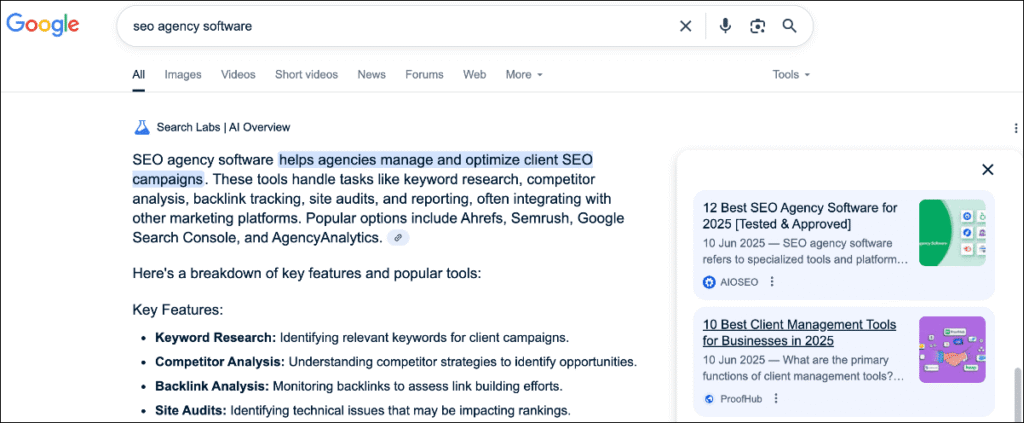
If you optimize your startup’s content for these, you can capture attention before users even click.
Here’s how to get your content ready:
- Answer questions directly. Write clear, concise answers (2–4 sentences) for common industry questions, then expand with more detail below.
- Structure your content for scanning. Use subheadings, bullet points, and numbered lists to help AI systems extract key points. This also improves your readability score.
- Target long-tail, conversational keywords. People often phrase searches as questions or natural statements (e.g., “how to get funding for a SaaS startup”).
- Include authoritative sources. Link to reputable references or studies—AI systems favor credible, well-supported content.
- Use schema markup. Structured data helps AI understand your content’s context and improves your chances of being featured.
- Leverage llms.txt. This is a file that helps AI platforms better understand and cite your content
For startups, this is an opportunity to punch above your weight. Even if your domain isn’t as big as established competitors, a well-structured, well-optimized page can still be surfaced in AI-generated summaries. As a result, you can get your brand in front of potential customers faster.
For tips on winning with this strategy, check out our guide on ranking in AI Overviews.
9. Build Topical Authority
If you want your startup to stand out in search results, you can’t just publish 1 or 2 blog posts and call it a day. You need to prove to Google that you’re a trusted, go-to expert in your niche.
That’s where topical authority comes in.
What Is Topical Authority?
Topical authority means showing deep, consistent expertise on a specific subject that matters to your target audience. Instead of writing scattered posts on unrelated topics, you create a network of high-quality, interlinked content that covers your niche from every angle.
For startups, this could mean:
- Creating topic clusters around a core pain point your product solves. For example, if you sell project management software, you might build clusters around remote team collaboration, time tracking, and workflow automation.
- Developing cornerstone content. This is a comprehensive, in-depth guide that serves as the hub for each cluster. This main guide links out to supporting posts, case studies, and tutorials.
When you organize your content in this way, Google sees your startup as a credible resource in your field. Plus, visitors stay longer because they can explore related articles without leaving your site. This boosts engagement and trust.
The more you build these interlinked clusters, the more your startup becomes the authority that customers and search engines turn to. And AIOSEO’s Link Assistant makes this easy. It automatically suggests relevant internal links to your cornerstone content and helps you add them with just a few clicks—no manual searching required.
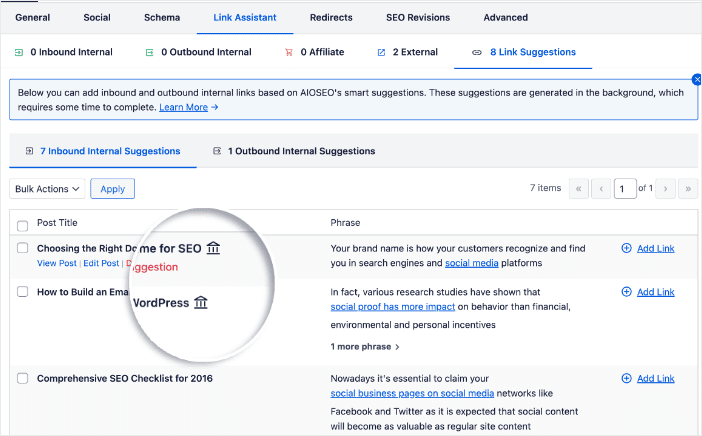
Why internal linking matters:
- Improves user navigation and engagement
- Helps Google see your site structure more clearly
- Increases your chances of being featured in AI Overviews for multiple related queries
By building out comprehensive topic clusters and linking them properly, you’re not just helping users. You’re also training search engines to trust your expertise. Over time, this boosts your chances of ranking for your main keywords.
10. Earn High-Quality Backlinks Early
If you’re running a startup, backlinks are one of the fastest ways to build credibility with Google, potential investors, customers, and media outlets.
Think of backlinks as digital recommendations. When respected sites in your niche link to you, they’re saying, “This startup knows what it’s talking about.” That vote of confidence can dramatically improve your search rankings and help you compete with bigger, more established brands.
Why Are Backlinks a Startup’s SEO Shortcut?
Backlinks are a growth lever for startups. A few reasons for this are that they:
- Signal trust fast: As a new business, you don’t have years of history behind you. Backlinks help bridge that gap by telling search engines you’re worth paying attention to.
- Boost niche authority: Links from industry-relevant blogs, media outlets, or partner sites tell Google you’re a serious player in your field.
- Drive referral traffic: The right backlink doesn’t just help SEO. It can send real customers your way today.
To build backlinks, one of the best ways is to partner with complementary startups or local businesses for cross-promotional content. You can also pitch your story to niche blogs or journalists who cover your industry.
My favorite method, however, is creating resources that others will want to reference. This can be anything from creating data reports to case studies to free tools.
If you focus on quality over quantity, you’ll build a backlink profile that works for both SEO and brand credibility.
Check out our ultimate link building guide for tips on building impactful backlinks.
11. Boost Brand Visibility for Your Startup
For startups, visibility isn’t just about getting your name out there. It’s about building trust, credibility, and recognition in your niche. The more consistently your brand appears in relevant, authoritative spaces, the more likely you are to earn both search engine rankings and AI-driven mentions.
Here’s how to make it happen:
Be Active Where Your Audience Is
Share your content on the platforms your target audience actually uses. That might be LinkedIn for B2B, Reddit and niche forums for tech-savvy users, or Twitter/X for thought leadership.
Tools like AIOSEO’s AI Content Generator can help you quickly repurpose blog posts into social media snippets, email copy, or optimized metadata.
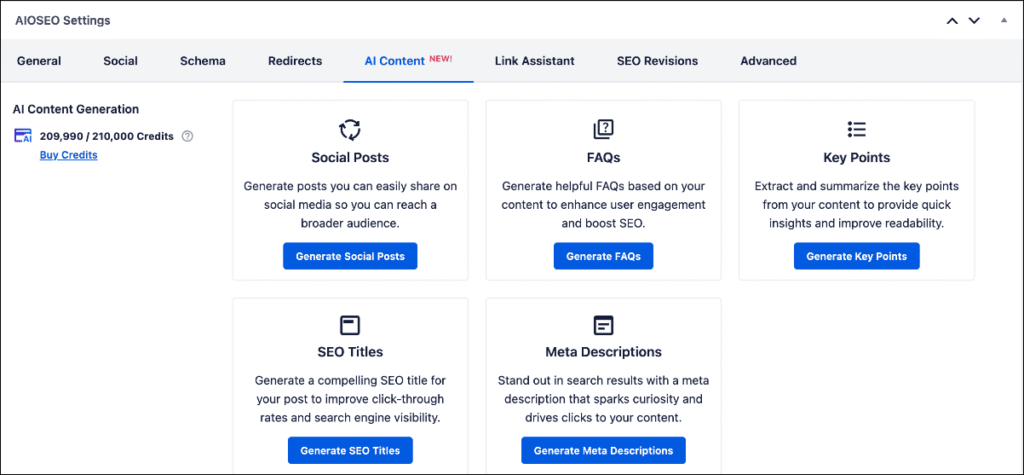
This saves your team time while keeping your messaging consistent.
Claim and Optimize Branded Profiles
Secure your presence on high-value directories and industry platforms such as Google Business, Crunchbase, or GitHub. Use the same brand voice, logo, and core keywords across every profile. For local or location-based startups, an optimized Google Business Profile is especially important for both SEO and credibility.
Check out our article on using your Google Business Profile to boost your SEO.
Get Mentioned Online—Even Without Links
AI and search engines can recognize brand mentions even without a hyperlink. Landing mentions on respected sites, podcasts, or news outlets boosts your credibility in the eyes of both humans and algorithms. In fact, a recent Ahrefs study found that brand mentions were one of the strongest signals for being featured in AI-generated summaries.
Join the Conversation on Q&A Platforms
Another way to boost your brand visibility is to join conversations your target audience is having. Answering questions on Quora, Reddit, or niche-specific communities helps you:
- Build brand authority in front of a relevant audience.
- Earn organic visibility in search results.
- Create content that AI systems might pull into summaries.
When participating, lead with value, not a sales pitch. Share detailed, practical insights and link back to your startup’s content only when it’s genuinely helpful.
Startup SEO is about creating a web of trust around your brand. If AI and search engines keep seeing your name in credible, relevant places, you’re far more likely to earn rankings, citations, and a steady flow of organic traffic.
SEO for Startups: Start Early, Win Fast
Investing in SEO early is one of the most strategic decisions a startup can make for sustainable growth. Remember, it can help you quickly build credibility, visibility, and trust. It’s also a cost-effective customer acquisition strategy that can help you start generating revenue even on a minimal marketing budget.
I hope this post helped you know how to do SEO for startups. You may also want to check out other articles like our ultimate guide to WordPress SEO or our list of the best SEO plugins.
If you found this article helpful, then subscribe to our YouTube Channel. You’ll find many more helpful tutorials there. You can also follow us on X (Twitter), LinkedIn, or Facebook to stay in the loop.
SEO for Startups: Your FAQs Answered
Why is SEO important for startups?
SEO helps startups achieve organic visibility, attract potential customers who are actively searching for relevant solutions, and build long-term growth without relying solely on paid advertising. A strong SEO foundation increases credibility and trust with both search engines and users.
When should a startup begin investing in SEO?
Ideally, startups should focus on SEO from day one. Even basic steps—like keyword research, technical setup, and a clear content strategy—can prevent costly fixes later on and deliver compounding results over time.
Can startups succeed in SEO with a limited budget?
Yes. Many effective SEO strategies require more time and effort than money. Tools like AIOSEO, Google Search Console, LowFruits, and others can offer crucial insights for startups with limited resources.
Disclosure: Our content is reader-supported. This means if you click on some of our links, then we may earn a commission. We only recommend products that we believe will add value to our readers.
